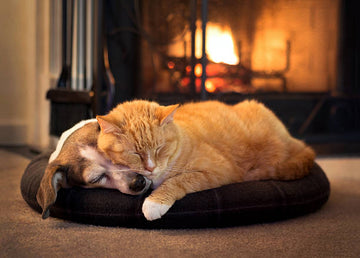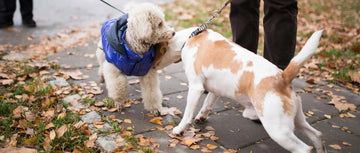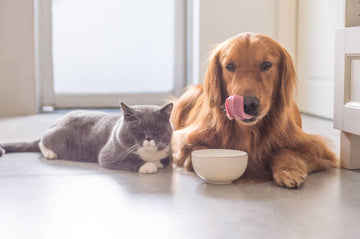Have you ever wondered what your furry friends are dreaming about when they twitch their paws or make cute noises in their sleep? Well, you're not alone. Many pet owners and animal lovers are curious about the inner lives of their four-legged companions. Do dogs and cats dream like we do? And if so, what do they dream about?
Scientists have been studying animal dreams for decades, and they have found some fascinating clues that suggest dogs and cats do indeed dream, just like we do. Here are some of the things we know about how our pets dream.
How do we know dogs and cats dream?
One of the main ways we can tell that dogs and cats dream is by looking at their brain activity during sleep. When we sleep, we go through different stages of sleep, each with different patterns of brain waves. One of these stages is called rapid eye movement (REM) sleep, which is when most of our dreaming occurs. During REM sleep, our eyes move rapidly under our eyelids, and our brain activity is similar to when we are awake. We also experience muscle paralysis, which prevents us from acting out our dreams.
Dogs and cats also go through REM sleep, and they show similar signs of dreaming as we do. They have rapid eye movements, increased brain activity, and muscle twitches. They also make noises, such as barking, meowing, or growling, which may indicate what they are dreaming about.
What do dogs and cats dream about?
Well, that's harder to answer, since we can't ask them directly. However, based on their behavior and brain activity, we can make some educated guesses. For example, some experts believe that dogs and cats dream about their daily activities, such as playing, hunting, or interacting with their owners. They may also dream about things that are important to them, such as food, toys, or other animals. And just like humans, they may have nightmares about things that scare them, such as loud noises, strangers, or predators. They may also dream about things that they have experienced during the day, such as playing, hunting, or exploring.
Some studies have suggested that dogs and cats may dream in a similar way as humans do, by replaying memories and processing emotions. For example, a study by MIT researchers found that rats could replay a maze they had learned during the day in their dreams. They also found that rats could modify their dreams by changing the order or direction of the maze. This suggests that rats could use their dreams to learn from their experiences and solve problems.
Another study by Harvard researchers found that dogs could show signs of fear or anxiety in their dreams, which may indicate that they have nightmares. They also found that dogs could show signs of happiness or excitement in their dreams, which may indicate that they have pleasant dreams.
How can we help our dogs and cats sleep better?
Dreaming is an important part of sleep for both humans and animals, as it helps us consolidate memories, regulate emotions, and enhance learning. However, dreaming can also be disrupted by various factors, such as noise, light, temperature, or stress. If our dogs and cats don't get enough quality sleep, they may suffer from health problems, mood changes, or behavioral issues.
Therefore, it is important to provide our pets with a comfortable and safe sleeping environment. Here are some tips to help your dogs and cats sleep better:
- Provide them with a cozy bed or blanket that suits their size and preferences. You can check out more of the products at our shop.
- Keep their sleeping area quiet and dark at night. You can use curtains, blinds, or shades to block out any external light sources.
- Avoid disturbing them while they are sleeping. If you need to wake them up for any reason, do so gently and gradually.
- Maintain a regular sleeping schedule for your pets. Try to keep them awake during the day and let them sleep at night.
- Avoid feeding them too close to bedtime, as this may cause digestive issues or affect their metabolism.
- Make sure they get enough exercise and stimulation during the day. This will help them burn off excess energy and reduce stress.
- Consult your veterinarian if your pets show any signs of sleep disorders, such as insomnia, excessive snoring, or narcolepsy.
In sum, next time you see your dog or cat sleeping peacefully, don't be surprised if they start to move or make sounds. They might be having a wonderful dream about chasing a squirrel or cuddling with you. Or they might be having a bad dream about a vacuum cleaner or a vet visit. Either way, they are probably dreaming just like you.






